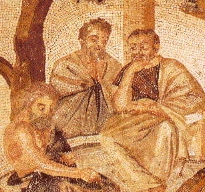
Plato's Writings on the Trial and Death of Socrates
Euthyphro
Apology
Crito
Phaedo
Benjamin Jowett's Introductions to Plato's Writings
Introduction to Euthyphro
Introduction to Apology
Introduction to Crito
Introduction to Phaedo
The Relationship Between Socrates and Plato
Most of what we think we know about Socrates comes from a student of his over forty years his junior, Plato. Socrates himself wrote--so far as we know--nothing. Plato (427 to 347 B.C.E) is especially important to our understanding of the trial of Socrates because he, along with Xenophon, wrote the only two surviving accounts of the defense (or apology) of Socrates. Of the two authors, Plato's account is generally given more attention by scholars because he, unlike Xenophon, actually attended the one-day trial of Socrates in Athens in 399 B.C.E.
Plato's metaphysics and epistemology appear to have been originally influenced by Presocratic thinkers. As a young man, however, Plato became a student of Socrates and turned his attention to the question of what constitutes a virtuous life.
Almost all of Plato's writings date from after Socrates's trial and execution. Although Plato earlier showed an interest in politics, Socrates' death sentence and disillusionment with the behavior of an oligarchy known as the Thirty Tyrants that assumed power in 404 seem to have caused Plato to turn to a life of philosophical reflection and writing. (Plato is often closely identified with the discredited eight-month rule of the Thirty Tyrants because of the large role played in that government by his mother's uncle, Critias, and a lesser role played by his mother's brother, Charmides. During their brief hold on power, the oligarchy practiced widespread executions of political opponents and confiscated the property of wealthy Athenians.)
Plato's writings are generally divided into three broad groups: the "Socratic" dialogues (written from 399 to 387), the "Middle" dialogues (written from 387 to 361, after the establishment of his Academy in Athens), and the "Later" dialogues (written in the period between 361 and his death in 347). Three of Plato's four writings concerning the last days of Socrates come from the earliest "Socratic" period: Euthyphro, the Apology, and the Crito. Euthyphro is an imagined dialogue between Socrates and Euthyphro about piety--Socrates stood charged with impiety--as Socrates prepared to enter the Royal Stoa to formally answer the charges brought against him by Meletus and other accusers. The Apology is presented as the speech given by Socrates in his own defense at his 399 trial. The Crito is a piece in which Socrates discussed his obligation to accept his punishment of death, however unjust he and his supporters might think it to be. Phaedo, a dialogue describing Socrates' thoughts on death and other subjects before he drinks the fatal hemlock comes from Plato's middle, or transitional period.
Because of Plato's obviously high regard for his mentor, many scholars suspect that in his Apology Plato failed to disclose some of the most compelling evidence of Socrates' guilt. While recognizing, of course, that the Apology is not a verbatim account of Socrates's speech, other scholars argue that Plato's account must be fairly accurate. These scholars point out that Plato wrote at a time during which he could expect many of his readers to have firsthand knowledge of the trial, reducing any incentive he might have had to present the case of Socrates too sympathetically. They also note that at least on two large points, both Plato's and Xenophon's accounts are in agreement: first, Socrates's speech had a defiant tone (one might call it an "unapologetic" apology) and, second, Socrates most likely could have secured acquittal had he only been willing to make certain concessions to his jurors.
Links to biographies of Plato:
Bernard Suzzane, "A Short Biography of Plato"
Anthony Beavers and Christopher Planeaux, "The Life of Plato"
